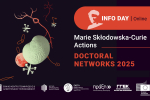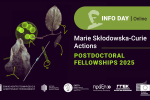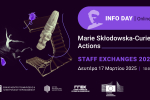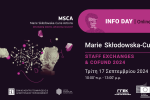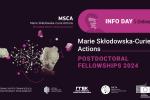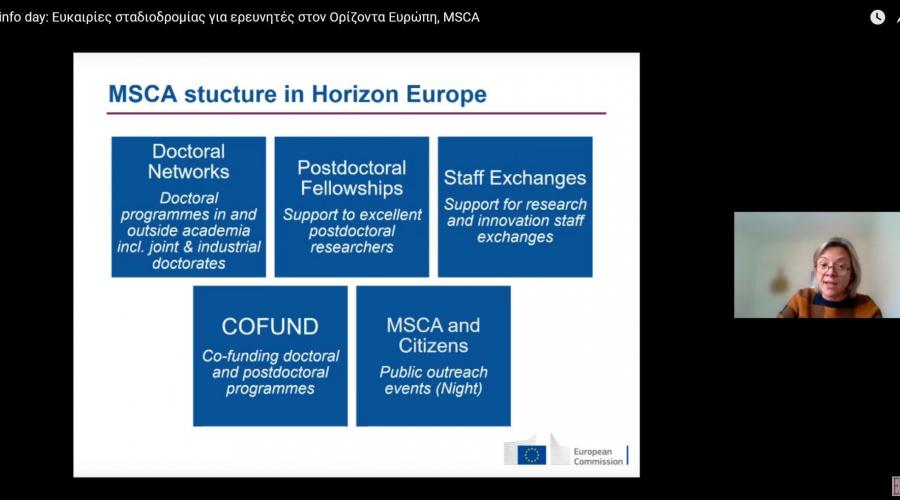
With more than 700 participants from Greek and Cypriot researchers, the online event 'Career Opportunities for Researchers in Horizon Europe: Marie Skłodowska-Curie Actions (MSCA)' took place on Thursday, July 8, 2021, with speakers from the European Commission, national representatives, experts and National Contact Points for MSCA actions in Horizon Europe. The event was organised by the National Documentation Centre (EKT), National Contact Point for MSCA actions, in collaboration with the General Secretariat for Research and Innovation (GSRI), the European Commission (DG EAC) and the Research Executive Agency (REA).
It was attended by more than 700 people via the Microsoft Teams platform, with the audience consisting of Greeks and Cypriots at various stages of study (70% PhD candidates, PhD holders and postdoctoral fellow) and faculty members from all research fields from 25 countries, with Greece, Cyprus, England, Germany, Sweden and Belgium recording the most attendees.
The event was introduced by Dr. Evi Sachini, Director EKT, who welcomed the young researchers and noted that the flagship MSCA actions, from its inception in 1996 until today, is the EU programme for doctoral education and postdoctoral training. She pointed out that, in the period 2014-2020, under the Horizon 2020 programme, more than 65,000 researchers were supported in Europe and worldwide, including 25,000 doctoral dissertations. She also stressed that MSCA actions in Horizon Europe could bridge the gap between research and entrepreneurship in the country.
In a video message, Athanasios Kyriazis, General Secretary of Research and Innovation, referred to the MSCA actions as one of the tools provided by the General Secretariat for Research and Innovation to support the scientific community of the country.
Theodoros Loukaidis, Director General of the Cyprus Research and Innovation Foundation (RIF), underlined the decisive contribution of the MSCA actions to research and innovation in Cyprus, while also referring to the memorandum of co-operation between his organisation and EKT which is intended to enhance research and innovation ecosystems of the two countries. The co-operation envisages, among other things, the encouragement of Greek and Cypriot bodies for the submission of joint research proposals to the Horizon Europe programme, particularly the Marie Skłodowska-Curie Actions.
The floor was then taken by the representatives of the European Commission. Eleni Konsta from the Marie Skłodowska-Curie Actions Department of the Directorate-General for Education, Youth, Sports and Culture (DG EAC) was the first to highlight important aspects of MSCA actions in Horizon Europe, such as the bottom up approach as well as the connection between academia and business. Ioannis Bitsios and Thodoris Staikos, Research Programme Administrators at the Executive Committee of the European Commission (REA), presented statistics on Greek participation in the MSCA programme in recent years, as well as the conditions for awarding MSCA scholarships to researchers.They also presented the new Horizon Europe calls for Doctoral Networks and Postdoctoral Fellowships, funding opportunities and explained the changes in MSCA actions, in relation to Horizon 2020.
Subsequently, Sosanna Kolyva, MSCA National Representative for Horizon Europe, from the Pasteur Institute, and Anna Rosenberg, MSCA Expert for Horizon Europe from the General Secretariat for Research and Innovation, talked about the great participation of Greece in the MSCA, targeted actions that can further increase participation and improve research networks, and other national actions that can jointly enhance research and innovation in the country.
Dr. Cristina Pascual from EKT presented the overall activities of the organisation in support of the research, academic and business community. EKT has highlighted, framed and supported the work of the National Contact Points, providing advisory guidance to researchers, businesses and organisations throughout their journey: from identifying opportunities to successfully submitting of proposals and disseminating research results.
Christiana Siambekou from the PRAXI / FORTH Network and Dimitrios Sanopoulos from CERTH presented the range of support services they provide for organisations and researchers interested in participating in Horizon Europe, specifically in MSCA actions.The event was co-ordinated by Dimitris Maragos, National Contact Point for MSCA Actions and Communication Officer of the ' Knowledge and Partnership Bridges' Initiative implemented by EKT.
All the presentations (pdf.) can be found here, while you can watch the whole event in the video below.
Watch the video.
Throughout the event, the audience could address live questions to the speakers, which were answered at the end of the presentations. In addition, participants could take part in interactive polls about their field of study, and the city from where they were attending the event.
Marie Skłodowska-Curie Actions (MSCA)
The Marie Skłodowska-Curie Actions, with a budget of around € 6.6 billion (2021-2027), seek to meet the European goal of a strong, resilient, flexible and creative human resource base with the right combination of skills, and will be able to meet the future needs of the labor market and innovate. In the period 2014-2020, the Horizon 2020 programme supported more than 65,000 researchers in Europe and worldwide, and funded over 1,000 top international doctoral networks.
The MSCA Doctoral Networks Action targets organisation networks for the creation of doctoral programmes, open to all research fields, including:
• Industrial Doctorates, for training in academic and industrial fields, under joint supervision.
• Joint Doctorates, for the co-operation of organisations that will lead to a joint / multiple doctoral degree.
The MSCA Postdoctoral Fellowships Action is a funding programme for postdoctoral training open to all research areas. As part of this Action, postdoctoral researchers move to a new organisation in a different country, acquiring additional skills and abilities while working on a specific research project, and at the same time transferring their knowledge and experience to the new organisation.
EKT as a National Contact Point for Horizon Europe
EKT is the National Contact Point for Horizon Europe for the Marie Skłodowska-Curie Actions (MSCA) programme in Pillar 1, for "Health" and "Digital Technologies, Industry and Space" clusters in Pillar 2 . It supports organisations, companies, academia and research organisations: from identifying funding opportunities to drafting and submitting proposals, implementing projects and exploiting research results. In addition, it contributes to the recording and analysis of Greece's participation in European research and innovation programmes. As a National Contact Point, it supports the implementation of ongoing projects under Horizon 2020.
With combined value-added services, EKT supports the Greek research and business community to excel and grow internationally. As co-ordinator of the Greek node of the Enterprise Europe Network, the largest business support network in the world, it provides services complementary to those of the National Contact Points, acting as a 'one-stop-shop' for informing companies on European issues, to finding business partnerships abroad, for technology transfer and innovation services, for mediation in international technological collaborations, for access to European funding and finding partners to participate in research proposals.








